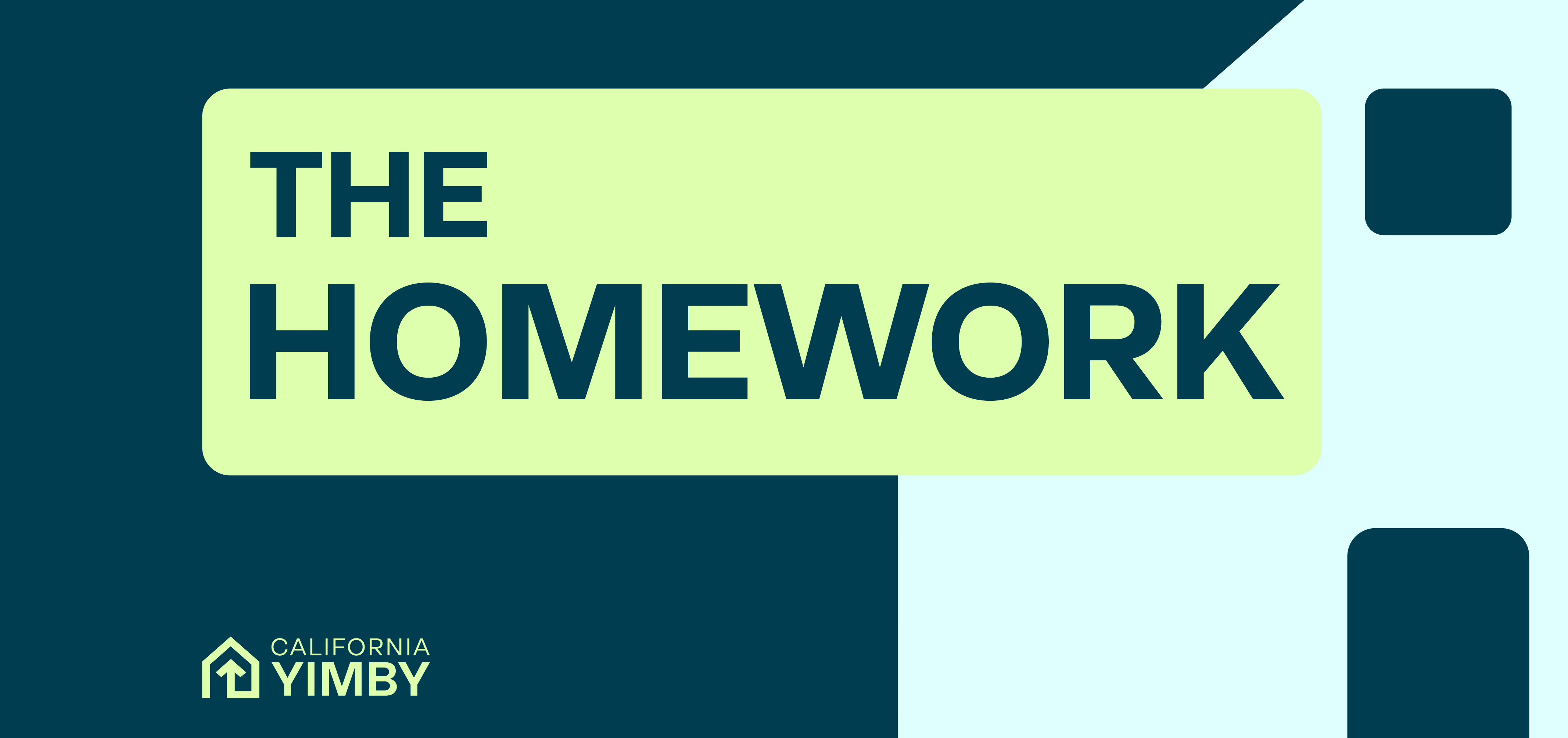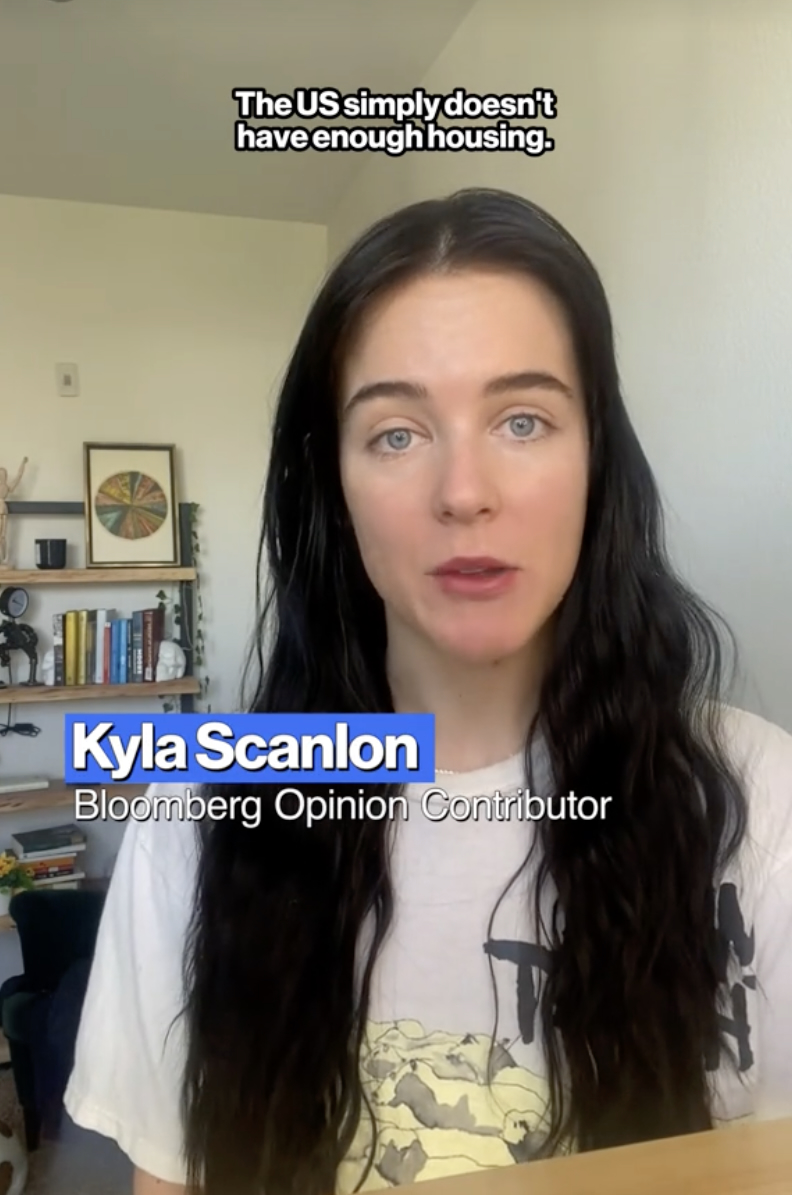The Homework: July 25, 2024

Welcome to the July 25, 2024 Main edition of The Homework, the official newsletter of California YIMBY — legislative updates, news clips, housing research and analysis, and the latest writings from the California YIMBY team.
News from Sacramento
The Legislature will reconvene from its legislative recess on August 3, and is expected to hold Appropriations Committee hearings and floor votes. Bills with a fiscal cost will be heard in the Appropriations Committee, while bills with low or no fiscal cost will go straight to the floor.
The last day for the Appropriations Committee to report bills out of committee is August 16; from August 19 to August 31, the Legislature will have a floor session to end the legislative session.
The following California YIMBY sponsored and high-priority bills are in the appropriations committee:
Sponsored Bills:
- SB 1123 (Caballero): This bill updates SB 684 (2023) to make it legal to build up to 10 homes on single-family zoned vacant lots.
- SB 937 (Wiener): This bill will authorize deferrals of impact fees and extends entitlements in order to provide developers tools to pencil out projects.
- SB 1211 (Skinner): This bill will encourage more ADUs on multifamily properties by providing more flexibility around how ADUs can be built alongside existing multifamily housing.
- AB 1820 (Schiavo): This bill will require cities to provide a precise estimate of the fees required for a proposed housing development at the time of building permit application.
High Priority Bills:
- AB 2144 (Grayson): This bill will reduce uncertainty around new home building by requiring local governments to provide evidence in their Annual Progress Reports, required by the state’s Regional Housing Needs Assessment, that they are complying with existing laws regarding transparency in impact fees.
- SB 1210 (Skinner): This bill will help to eliminate uncertainty around utility connection fees by requiring that fees are clear, transparent, and posted online.
California YIMBY also has a sponsored bill that is going straight to the Senate Floor due to Senate Rule 28.8, which allows bills to be sent directly to the Senate Floor for second reading if the Senate Appropriations Chair determines that the bill’s costs are not significant.
Sponsored Bills:
- AB 2580 (Wicks): This bill will require local governments to monitor how new historic designations could impact their ability to meet housing needs under existing state law, and report new historic buildings and districts to the California Department of Housing and Community Development (HCD) during the Annual Progress Report of the Regional Housing Needs Assessment process.
Lastly, our sponsored bill AB 3057 (Wilson), a technical fix to an existing law that will grant local Junior ADU ordinances the same exemption from environmental review that is already granted to standard ADU ordinances, recently passed the Senate Housing and is making its way to the Senate Floor.
To stay current on what housing bills California YIMBY is sponsoring, supporting, and watching, you can now use our Abstract link to track with us.
Stay tuned to future editions of The Homework, and follow the California YIMBY Twitter channel, @cayimby, to stay up to date on developments on the legislative session and related news.
Housing Research & Analysis
Movin’ On Up? The Low Ceiling of North American Elevator Standards
Why do we have so many walk-up apartment buildings without elevators in North America, and why are buildings with elevators so expensive compared to the rest of the world?
In a new report simply titled “Elevators”, Stephen Smith, from the Center for Building in North America, goes deep to document how our regulatory environment drives up costs—in the United States and Canada, elevators cost about three times as much as they do in peer countries—and reduces accessibility.
Smith identifies three key factors behind elevator cost bloat in the United States:
- Regulations requiring unusually large cabins that can accommodate a fully extended seven-foot stretcher, rather than a wheelchair and attendant
- A highly-specialized and insular market for elevator technician labor
- A patchwork of technical codes that do not align with the global standards
Defective Condo Defect Laws: Ripe for Repair?
Since 2011, 97 percent of California’s new multifamily housing has been built for rent, not for ownership. While the state needs to continue to build hundreds of thousands of rentals – more supply will drive down housing costs, and stabilize rents – it should not be doing so to the exclusion of offering more pathways to affordable, middle-income ownership for Californians who want to own their home.
The current scarcity of new, multifamily homes for sale has major implications for housing affordability, as condominiums and townhouses are less expensive than detached, single-family homes. And the culprit, in part: Outdated regulatory changes intended to protect consumers from construction defects.
A new report, “Construction Defect Liability in California: How Reform Could Increase Affordable Homeownership Opportunities,” from Muhammad Alameldin and Sarah Karlinsky at the Terner Center for Housing Innovation, explores the history of condo defect law, details different regulatory approaches from around North America, and makes recommendations for reform.
Key Takeaways:
- California’s condo defect laws discourage the development of new multifamily housing for ownership by making construction financially risky for developers and general contractors.
- Other states have different systems that better balance consumer protection and cost.
- To encourage condo development, California should adopt best practices from other states, like a graduated statute of limitations for construction defects, home warranty programs, and “right to repair” with mandatory binding mediation.
Houser Headlines
- YIMBY cities show how to build homes and contain rents
- The American Elevator Explains Why Housing Costs Have Skyrocketed
- To Solve San Diego’s Housing Crisis, We Need Walkable, Bikeable Communities
- Housing Insecurity Makes Black Californians Face Higher Rates of Psychological Distress
- Bay Area builders say city impact fees hinder new housing. A recent Supreme Court ruling may give developers more power to fight them.
- Supreme Court gives cities in California and beyond more power to crack down on homeless camps
- Berkeley, 1st City to Sanctify Single-Family Zoning, Considers Historic Reversal: Allowing Small Apartments | KQED
- Evading CA housing laws
- Abolish HOAs: Homeowner Associations Make It Harder to Own a House – Business Insider
- This housing fix could help build more homes. But firefighters are sounding the alarm. – Route Fifty
- Faced with community complaints, Mayor Karen Bass retools her affordable housing strategy
- San Bernardino County supervisors ask state to declare emergency over homeowners insurance Does Managed Retreat Make Sense in Wildfire-Prone Lands? – Public Policy Institute of California
YIMBY Social – Top Posts

Share the good word
We welcome your ideas and feedback — send story tips and ideas to Homework@cayimby.org.